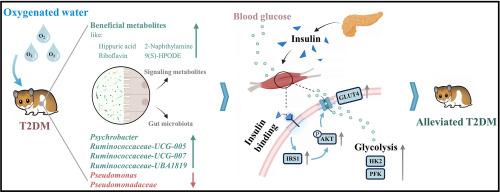膳食含氧水通过调节肠道微生物群和增强骨骼肌的葡萄糖代谢缓解 2 型糖尿病
IF 4.8
1区 农林科学
Q1 FOOD SCIENCE & TECHNOLOGY
引用次数: 0
摘要
2 型糖尿病(T2DM)是因糖代谢失调而引起的重大健康问题,因此需要采取有效的饮食干预措施。新的证据表明,糖尿病与缺氧之间存在相关性,这表明富氧水(ORW)可能有望缓解 T2DM。本研究采用了一种涉及生理学、基因组学、代谢组学、转录组学和分子生物学分析的多层面方法来研究 ORW 对 T2DM 的影响及其内在机制。结果表明,ORW 能有效改善 T2DM 的主要症状,包括改善多尿和多食、降低空腹血糖、增强葡萄糖耐量和提高胰岛素水平。值得注意的是,ORW 的有益作用似乎是通过影响肠道微生物群组成和代谢物谱来调节肠道与肌肉之间的相互作用。转录组和分子分析表明,ORW激活了Akt信号通路,并上调了骨骼肌中参与葡萄糖摄取和利用的关键基因,p-AKT/AKT比率的增加以及Irs1、Glut4、Hk2和Pfk的上调就是证明。总之,这些研究结果表明,ORW可通过调节肠道微生物群缓解T2DM,同时增强骨骼肌对葡萄糖的摄取/利用,支持其作为靶向调节T2DM的有效辅助策略的潜在用途。本文章由计算机程序翻译,如有差异,请以英文原文为准。

Dietary oxygenated water mitigates type 2 diabetes mellitus by modulating gut microbiota and enhancing glucose metabolism in skeletal muscle
Type 2 diabetes mellitus (T2DM) is a significant health concern resulting from dysregulation of glucose metabolism, emphasizing the need for effective dietary interventions. Emerging evidence suggests a correlation between diabetes and hypoxia, indicating that oxygenated water (ORW) may hold promise in mitigating T2DM. This study employed a multifaceted approach involving physiological, genomic, metabolomic, transcriptomic, and molecular biological analyses to investigate the effects of ORW on T2DM and its underlying mechanisms. The results demonstrated that ORW effectively ameliorated key symptoms of T2DM by improving polydipsia and polyphagia, reducing fasting blood glucose, enhancing glucose tolerance, and increasing insulin levels. Notably, the beneficial effects of ORW appeared to be mediated through modulation of gut-muscle interactions by influencing gut microbiota composition and metabolite profiles. Transcriptomic and molecular analyses revealed that ORW activated the Akt signaling pathway and upregulated key genes involved in glucose uptake and utilization in skeletal muscle, as evidenced by increased p-AKT/AKT ratio and upregulation of Irs1, Glut4, Hk2, and Pfk. Collectively, these findings demonstrate that ORW alleviates T2DM by modulating gut microbiota while enhancing glucose uptake/utilization in skeletal muscle, supporting its potential use as an effective adjuvant strategy for targeted regulation of T2DM.
求助全文
通过发布文献求助,成功后即可免费获取论文全文。
去求助
来源期刊

Food Bioscience
Biochemistry, Genetics and Molecular Biology-Biochemistry
CiteScore
6.40
自引率
5.80%
发文量
671
审稿时长
27 days
期刊介绍:
Food Bioscience is a peer-reviewed journal that aims to provide a forum for recent developments in the field of bio-related food research. The journal focuses on both fundamental and applied research worldwide, with special attention to ethnic and cultural aspects of food bioresearch.
 求助内容:
求助内容: 应助结果提醒方式:
应助结果提醒方式:


